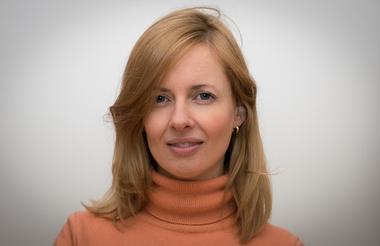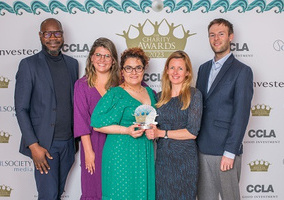In June this year, Freedom from Torture took home the top prize at the Charity Awards 2023 for its #StopTheFlights campaign that helped to convince four commercial airlines not to fly asylum seekers to Rwanda on behalf of the UK government.
A popular winner in the room, chief executive Sonya Sceats says the cheer her charity received when it was read out among the nominees “knocked us for six” and that she never expected to take home the trophy.
She says the accolade has benefited the charity’s staff, its supporters and the victims of torture to whom it provides services, who have felt “the arms of civil society in Britain wrapping around the organisation that is their lifeline”.
“For our staff, and for our community of supporters, the award has been just amazing. Because this is a really difficult time to be working and supporting charities who work to defend the rights of refugees and to ensure that they are made to feel welcome in Britain,” she says.
“Anyone who is working for Freedom from Torture, or who is identifying as part of a community of people funding this organisation, and joining our campaigns, you run in enormous risk of attracting ire from the government and those in the media and elsewhere who are backing its anti-refugee agenda.
“In some ways, it’s a message being sent from civil society leadership in Britain. And so, the way in which we interpreted that, as validation of the righteousness of our cause and our campaigning work, notwithstanding the virulent attacks on charities doing this work, was really heartwarming. And I think for people who give money to us, it was a validation of their investment in us.”
‘Crossing that red line’
“Originally an American, now an Australian in London”, according to her social media bio, Sceats says living in three different countries has shaped her world view and influenced her career.
She was born in the US to Australian parents and moved to their native country when she was four. While training as a lawyer in Australia, Sceats says was disturbed by the way that “successive conservative Australian governments came to power by weaponising refugees”, something she has since seen echoed in British political discourse.
“It was from that time that I really started to find ways that I could bring my energies to bear to ensure that refugees as a community weren’t used as a Trojan horse for destroying the checks and balances in our democracies,” she says.
Sceats moved back to the US to continue her studies and was appalled by the Central Intelligence Agency (CIA)’s programme of systematic torture of detainees under George W Bush’s presidency.
“Crossing that red line really galvanised me and that’s what took me to Freedom from Torture,” she says.
She originally joined the charity in 2008, when it was called the Medical Foundation for the Care of Victims of Torture, and held a series of policy and advocacy roles before briefly working as a lead advisor at Amnesty International (which Freedom From Torture grew out of in the 1980s).
Sceats returned to Freedom from Torture in 2015 as its director of policy before being promoted to CEO, initially on an interim basis, in November 2017.
‘What drives me is justice’
Sceats says she is “an odd soul” at Freedom from Torture, which has “a very feelings-based workforce”.
“People come to this work because they feel the pain of people who’ve suffered torture and they want to fix it. I’m not like that. I’m a much more cerebral person who’s come to this work because what drives me is justice.”
She says the charity’s core values are compassion and empathy but her route to the charity was through civil legal policy.
“I’m a lawyer, but even our lawyers at Freedom from Torture are really empathic people. I’m not unempathetic by any means, but I’m actually driven much more by principles. My real focus throughout all of my early adulthood was on the concept of the rule of law. Working to safeguard systems of checks and balances to ensure the most healthy society in which the rights of unpopular groups are protected, including by our legal system.”
Working with survivors of torture
Sceats says she is most proud of the charity’s work to incorporate survivors of torture, its former beneficiaries, into its service design and delivery.
Kolbassia Haoussou began petitioning the organisation 15 years ago to enable survivors of torture such as himself to use their expertise to benefit the charity’s other beneficiaries. His rallying, alongside others who had experienced torture, led to the creation of the Survivors Speak Out activist network, in which members campaign against the use of torture, talk about its impact and support survivors’ rights.
Now the charity’s director of survivor engagement, Haoussou also pushed for survivors to be involved in shaping the delivery of services at Freedom From Torture, which Sceats says was “hugely contested at the time”.
“He has overcome so much internal resistance, I can’t even tell you,” she says. “I was here for every step of the way and I saw it and I saw his tenacity, his diplomacy. His long game coming to fruition. It's not over yet. We've been on this journey for a really long time. He's done it by bringing people with him, other survivors, throughout the entire process and supporting others into leadership and that’s who he is – he’s an empowerer.”
More than a tenth of the charity’s workforce come from refugee backgrounds and recently the charity has focused on employing more survivors of torture to deliver its rehabilitation services, which Sceats says is “trailblazing in the global torture rehabilitation world”.
“Our drive over the last few years to employ more people who have been tortured has trebled our employed survivor workforce from just a handful to nine (around 5% of employees), with another four or so survivors expected to join our staff team before the end of the year,” she says.
Sceats says the charity has “come so far” over the past 15 years, with some of the charity’s clinicians previously being “really hostile” to the idea of delivering services alongside survivors.
Now the charity is “attracting clinicians to come to this organisation, even though we can’t match NHS pay, because they want to be part of this cutting edge”.
“It’s become the draw to work with us now, the opportunity not just to work, to rehabilitate survivors, but to work with other survivors to achieve that end,” she says.
“I’m so proud of it and I’ve had nothing to do with it. I’m proud of this organisation for that journey that we've been on. We are best in show on this front and I can't credit Kolbassia and the survivors who he has been working with enough for believing that this charity would catch up with them as we’ve done.”
Growth ambitions
Another focus for Freedom from Torture is growing its capacity, with an aim to double the number of people it provides rehabilitation services to by 2025 and to grow its income by 30%.
It has set these goals as it currently lacks the capacity to meet demand for its services, “turning away two referrals that we would want to accept for every one referral that we accept”.
But the charity’s growth targets were set before the cost-of-living crisis, to which the charity is “really exposed” due to its reliance on public fundraising.
“In the first year of the strategy, we were able to increase the number of people helped by 17%,” says Sceats.
“So, we were all making really good progress and we’re still making some fair progress, but I’m worried from here on in. And I absolutely need to find ways to shore up our income base and to continue the levels of growth and accelerate them so that we can deliver on the promises that we have made to survivors of torture.”
Freedom from Torture invested heavily in its fundraising last year to try and generate more income, with more than a third of its expenditure (£4.4m) going on raising funds. Its latest accounts say that for every £1 per spend on direct fundraising costs, it generates £3.21.
The charity’s overall income grew by 16% in 2022 to £11.9m, 94% of which came from public fundraising, driven by two large legacy donations worth a combined £1.5m.
“We were investing heavily in public fundraising and enjoying some great success. The salience of the issue, and the fact that Britain is a caring country, despite what the government tells us, meant that we’ve been enjoying some great success from really traditional means of fundraising, including face-to-face,” says Sceats.
‘Other refugee charities have come under much more fire than us’
Freedom from Torture also invests heavily in its campaigning work, winning several awards for this including this year’s Charity Award, with much of its activity aimed at challenging the government’s immigration policies that affect its beneficiaries, many of whom are seeking asylum in the UK.
This is not always well received by government departments, with the Home Office publicly criticising the charity earlier this year for a video it posted featuring Suella Braverman being confronted by a holocaust survivor at a public event.
Freedom from Torture refused the department’s request to delete the video of the home secretary in that instance and Sceats says it is not the only time the charity has been contacted government officials over its work.
She describes a Home Office civil servant “berating” her after the charity threatened to issue legal proceedings in relation to the department’s asylum decision-making policies.
“There is a growing permission, I think, that civil servants feel under this government to be hauling charity leaders over the coals for work that we’re legitimately doing to defend the rights of marginalised people in this country,” she says.
“Other refugee charities have come under much more fire than us. And the reason I think that they’ve come under fire is that they rely on contracts with the Home Office to deliver their services. We do not. On principle, Freedom from Torture will never take money from the Home Office and that gives us a level of independence.”
A Home Office spokesperson says in response that it works with “a range of organisations and experts” to ensure it “provides the right support” for asylum seekers. “All civil servants follow the civil service code of objectivity, honesty, integrity and professionalism,” they say.
‘Nobody really believes that they’ve got the backing of the Charity Commission’
Sceats has also previously expressed concern over the Charity Commission’s regulation of the sector’s campaigning activities.
She says that current chair Orlando Fraser has been more publicly supportive of charities’ right to campaign but remains concerned that the sector does not feel empowered to do so.
“Every charity CEO and every board of a charity that is doing campaigning work, especially in high profile areas that the government is seeking to weaponise for its own ends, is acutely aware that the Charity Commission has taken an increasingly, until recently, dim view of charities doing campaigning work,” she says.
“I think under the current leadership, they’re being smarter about it. But just look at the agenda around social media. You look closely at the speeches that the chair is giving and nobody’s taking huge comfort.
“Nobody really believes that the Charity Commission, in a full-throttle way, supports the need for charities to be calling out injustice, even if that means running up against government. Nobody really believes that they’ve got the backing of the Charity Commission for doing this socially vital work.”
A spokesperson for the regulator says in response to Sceats comments that it has repeatedly set out its commitment to promoting and defending charities’ right to campaign in furtherance of their purposes. They add: “It is also our role to help charities understand their legal duties and responsibilities when campaigning, including that any such activity […] must not be party political.”












